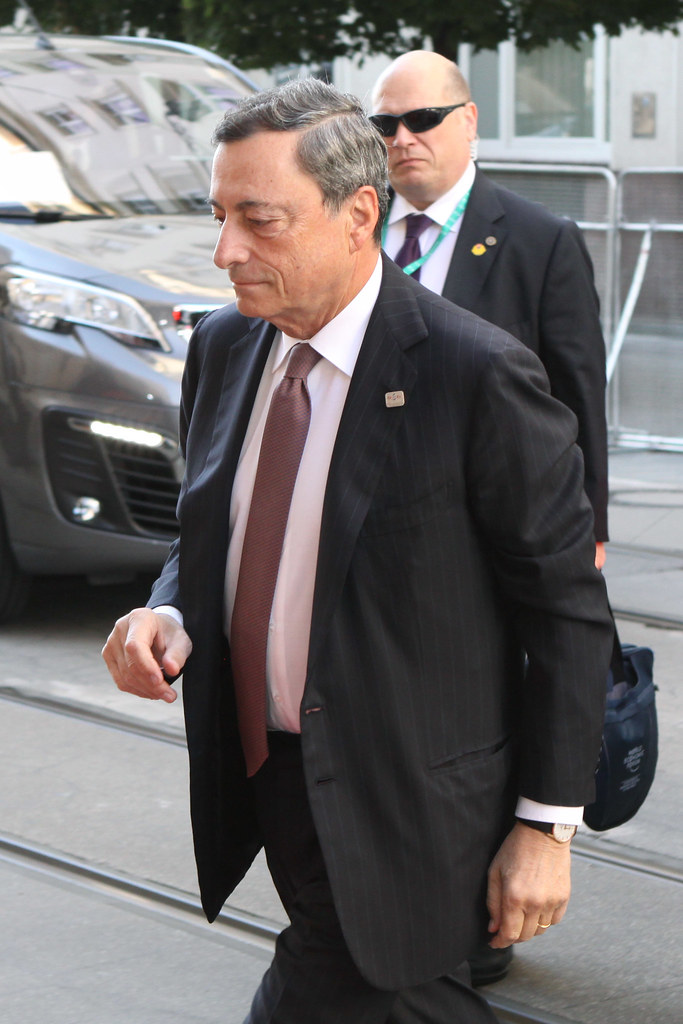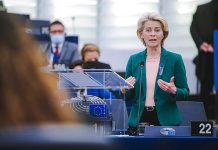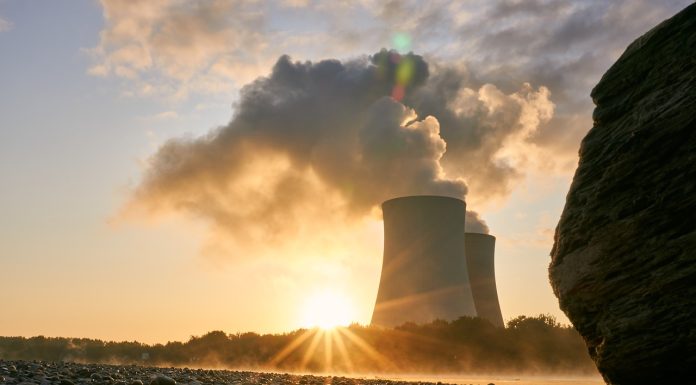By Belgian MEP Johan Van Overtveldt (Belgian Finance Minister between 2014 and 2018, Chairman of the European Parliament’s Budget Committee)
One year after the publication date of the Draghi report seems like a good moment to take stock. Splendid in its diagnosis and in pointing out what the policy priorities should be, the report refrains from one crucial imperative, i.e. that hard and difficult choices will need to be made. It is of course up to the political world and not Mario Draghi to make these choices and live up to them.
Whether at the European Commission, the European Council and/or the European Parliament, the enormity of the challenges awaiting serious and decisive treatment by the European authorities is breath-taking. A non-exhaustive list of these challenges would contain the war in Ukraine, the build-up of defense and security capacity, the restoration of lost competitiveness, the nerve-wracking evolution of the transatlantic relationship, the need to decarbonize, the precariousness of our energy supplies, the extremists’ assaults on democracy and the highly problematic nature of the public finances of some member states. The need to act and act quickly in each and every of these domains is constantly underlined by politicians, commentators and think tank wonks alike. Not to mention the always carefully worded warnings of worried central bankers.
The Draghi Report: Clear in Diagnosis
Most of the time these priorities and policy objectives are presented in such a way that the impression is raised that they all need to be pursued simultaneously and with more or less the same urgency. Take as an example the famous Draghi report of September 2024. This report presents a splendid analysis of what has been going wrong with the European Union’s economy and tries to offer remedies. More specifically, according to the former ECB boss’ conclusions, the European Union urgently needs to deregulate, to derisk and to decarbonize.
Deregulation is needed in order to raise productivity and fire up economic growth, two crucial economic parameters in which the EU is seriously lagging the United States and China. Derisking should be pursued so that Europe becomes less dependent on others (read: the United States) for its defense and security. Decarbonization is needed in order to reduce our dependency on fossil fuels and to contain the consequences of climate change. For these three objectives to be successfully pursued Mario Draghi estimated that €800 billion in additional annual investment, from the public and private sector combined, is needed.
The €800 Billion Illusion
Let’s stop here for a moment and make an effort to be realistic. €800 billion of extra investment … well, that is simply impossible even for a €20,000 billion economy as the EU one. Hence the need to make choices, a crucial point that was also very much stressed by Pierre Wunsch, the governor of Belgium’s central bank, when a Belgian delegation visited in the spring of this year major players of the financial and investment community in New York City.
The under-recognized necessity to make choices is in line with Lord Lionel Robbins’ almost a century-old definition of economics, being “the science which studies human behavior as a relationship between ends and scarce means which have alternative uses”. As far as the EU’s present predicament is concerned the main takeaway from the Robbins definition is that we have scarce resources at our disposal to devote to alternative uses, being the need to deregulate, to derisk and to decarbonize.
As far as the need to deregulate is concerned a lot can be achieved without spending money. Rationalizing existing regulation and giving extra attention to productivity and growth consequences when new regulation is hammered out, should in the present context be no-brainers. Talking from my own experience in the European Parliament, this is far from obvious. The set-up of the legislative process in the EU, mostly through the so-called trilogues, is destined to deliver complicated and over-burdening regulation. It will take giant political efforts from all sides involved to adopt more constructive attitudes in this process.
“As far as the need to deregulate is concerned a lot can be achieved without spending money“
A particularly crucial element of the regulatory environment in the EU is related to the capital markets union (CMU), a longtime policy objective of most European policymakers. Such a CMU is absolutely necessary in order to facilitate the investments needed to improve European productivity and to contribute in this way to more structurally sound economic growth. A personal note here: during my tenure as Belgian minister of Finance (2014-2018) I was visited in 2015 by Jonathan Hill, the then European Commissioner responsible for financial markets and capital markets union. His to-do list with respect to CMU matches exactly what Mario Draghi put forward in his 2024 report. So, over the course of nine years basically nothing significant has happened to bring us closer to a CMU.
Draghi, as did Hill in 2015, put forward three absolutely urgent measures in order to get closer to CMU. First, there is an urgent need for a single securities market regulator and a single rulebook. Second, the post-trade environment for clearing and settlement in Europe is far less unified than in the US. Third, tax and insolvency regimes across member states remain substantially unaligned. Making substantive progress on each of these three axes does not require billions of investment. It only requires member states and the Commission and the Parliament to make the right choices.
Next to deregulation Mario Draghi urged us to work diligently on derisking and decarbonization, both of which require huge investments. Given the limited resources available, choices will have to be made. Choices that will, beyond any doubt, touch raw political nerves in the different political groups in Europe. I want to be consequential here and line out what would be my own priority and that is focusing on derisking and prioritizing the strengthening of our defense and security capabilities.
Do I think decarbonization has become unimportant? No, not at all, but two basic developments cannot be overlooked in this context. First, Europe is out there leading the pack on CO2 reduction. The rest of the pack, being basically the United States, India and most of all China, are not following. Do we really want to push this all the way while our impact on the overall CO2 emission situation in the world is gradually being reduced because of the policies of “the pack”. The EU’s share in worldwide CO2 emissions now stands at 7% and is declining further.
Will our citizens accept the losses in jobs and income that further decarbonization in Europe certainly will lead to given, what the rest of the world is doing on the CO2 front? I don’t think so.
Innovation Will Drive Progress
Second, a wide range of CO2-friendly technologies is currently in the R&D pipeline. CCS (Carbon Capture and Storage), blue hydrogen, heat pumps, AI-driven models to optimize energy use, enhanced rock weathering and further developments in renewables and in nuclear energy provision are just a few examples of such developments. The economic rationale for further investments in these and other CO2-reducing ventures is in itself strong enough to expect them to be continued.
Derisking as Strategic Priority
Our investment focus today should be on derisking in order to strengthen our own defense and security capacities. It is a very unfortunate truth that in order to avoid major further conflict with Vladimir Putin’s Russia we will have to build up such strength in a credible and structural way.
It is wishful thinking to assume that an eventual peace deal in Ukraine, even if largely on Russia’s terms, would satisfy the geopolitical ambitions of the Russian president. Strength and power are also the only language that China understands when coming to negotiating tables. Finnish president Alexander Stubb was completely right when he declared earlier this year that “our holiday from history is over”. That harsh reality obliges us to act and most of all to prioritize and make choices in view of our limited resources.
“It is wishful thinking to assume that an eventual peace deal in Ukraine, even if largely on Russia’s terms, would satisfy the geopolitical ambitions of the Russian president“
Originally published on the blog of Johan Van Overtveldt.
Disclaimer: www.BrusselsReport.eu will under no circumstance be held legally responsible or liable for the content of any article appearing on the website, as only the author of an article is legally responsible for that, also in accordance with the terms of use.













